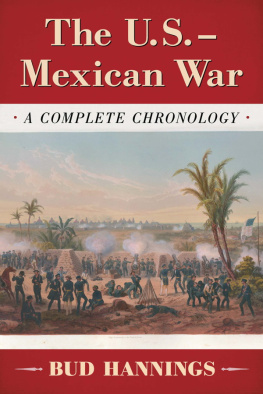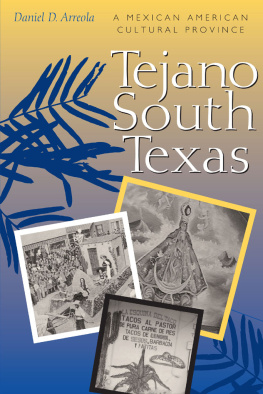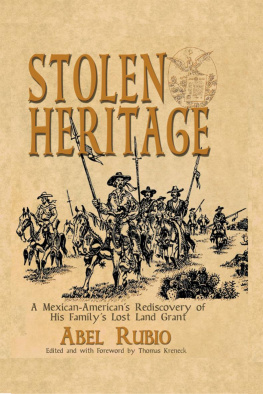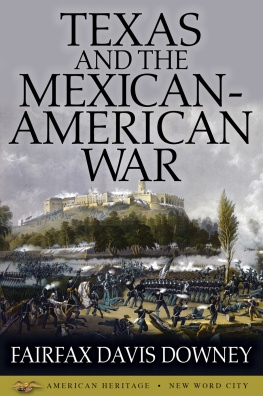The Texas Bookshelf
Other books in the series
Bill Minutaglio, A Single Star and Bloody Knuckles: A History of Politics and Race in Texas
Frank Andre Guridy, The Sports Revolution: How Texas Changed the Culture of American Athletics
Stephen Harrigan, Big Wonderful Thing: A History of Texas
The publication of this book was made possible
by the generous support of the following:
Christine and Charles Aubrey
Roger W. Fullington
Jeanne and Mickey Klein
Marsha and John Kleinheinz
Lowell H. Lebermann Jr.
Joyce and Harvey Mitchell
Brad and Michele Moore
Office of UT President William Powers Jr.
Ellen and Ed Randall
Jean and Dan Rather
Tocker Foundation
Judith Willcott and Laurence Miller
Suzanne and Marc Winkelman
The Mexican American Experience in Texas
Citizenship, Segregation, and the Struggle for Equality
MARTHA MENCHACA

University of Texas Press
Austin
Copyright 2022 by the University of Texas Press
All rights reserved
First edition, 2022
Requests for permission to reproduce material from this work should be sent to:
Permissions
University of Texas Press
P.O. Box 7819
Austin, TX 787137819
utpress.utexas.edu/rp-form
Library of Congress Cataloging-in-Publication Data
Names: Menchaca, Martha, author.
Title: The Mexican American experience in Texas : citizenship, segregation, and the struggle for equality / Martha Menchaca.
Other titles: Texas bookshelf.
Description: First edition. | Austin : University of Texas Press, 2022. | Series: The Texas bookshelf | Includes bibliographical references and index.
Identifiers: LCCN 2021010737 (print) | LCCN 2021010738 (ebook)
ISBN 978-1-4773-2437-0 (hardcover)
ISBN 978-1-4773-2438-7 (library e-book)
ISBN 978-1-4773-2439-4 (non-library e-book)
Subjects: LCSH: 973/.046872. | Mexican AmericansPolitical activityTexasHistory. | Mexican AmericansTexasHistory.
Classification: LCC F395.M5 M455 2022 (print) | LCC F395.M5 (ebook) | DDC 976.4/0046872dc23
LC record available at https://lccn.loc.gov/2021010737
LC ebook record available at https://lccn.loc.gov/2021010738
doi:10.7560/324370
Never doubt that a small group of thoughtful, committed citizens can change the world; indeed, its the only thing that ever has.
MARGARET MEAD, ANTHROPOLOGIST
Every moment is an organizing opportunity, every person a potential activist, every minute a chance to change the world.
DOLORES HUERTA, UNITED FARM WORKERS ACTIVIST
Just because youre paranoid doesnt mean they arent after you.
JOSEPH HELLER, NOVELIST
Contents
Introduction
This book offers a historical overview of Mexican Americans social and economic experiences in Texas from the Spanish period to the present. My aim is to focus on the political struggles that Mexican Americans faced in their pursuit of equal rights after Texas joined the United States. As I develop this narrative, I examine major turning points in the advancement, denial, or reversal of their civil rights quest by revisiting events that had statewide impact on their lives.
The narrative begins with the settlement of Texas during the Spanish and Mexican periods because it is necessary to look at who initially colonized the territory and how their ancestry influenced their incorporation into US society. Spanish and Mexican census records indicate that most settlers were a racially mixed people of Indian, Spanish, and African descent and that they were governed by a numerically small, elite white population. I argue that the mixed racial heritage of the Mexican American population affected the types of opportunities they were extended by Texas governments after independence. In 1836, Anglo-American immigrants who had settled in Texas broke away from Mexico and established the Republic of Texas. A few years later, Texas was annexed by the United States. Over the generations, and until the passage of the Civil Rights Act of 1964, Mexican Americans remained an ethnic minority population distinguished by their ancestral origin and mixed racial heritage. Treated as second-class citizens, they were not extended the political rights and social privileges enjoyed by Anglo-Americans.
The two main political struggles that Mexican Americans endured were how to assert their legal rights of citizenship and how to retain possession of their Spanish and Mexican land grants. Land and citizenship were interrelated social issues: if Mexican Americans were denied citizenship, their legal rights over property could be nullified. By the turn of the twentieth century, the fact that they were US citizens was no longer being questioned. Unfortunately, they continued to be treated as second-class citizens subjected to legal and social segregation. Under US law at the time, segregation was not seen as a violation of a persons constitutional rights. The US Supreme Court, in the Slaughter-House Cases (1873) and in subsequent decisions, ruled that state legislatures had the authority to determine what actions could be considered a violation of a persons civil rights. In Texas, it was not illegal to segregate Mexican Americans and African Americans from white people in public accommodations. The first exclusion law affecting Mexican Americans was affirmed by the Texas Supreme Court in 1885, and in 1907 such laws were expanded by the Texas Legislature to cover all forms of public accommodation. Allegedly, the intent of Texass exclusion laws was to protect citizens rights to operate their establishments as they pleased. By law, business owners and members of organizations and clubs could exclude any person from the use of their facilities or confine patrons to restricted areas. The outcome of Texass exclusion laws led many white residents to intentionally embarrass, mock, and deny services to Mexican Americans and African Americans.
From the 1920s to the mid-1950s, the Texas Legislature passed additional laws to separate Mexican Americans and African Americans from Anglo-Americans in residential districts and schools. Zoning laws, home rule authority, language policies, housing covenants, and cultural backgrounds were used to implement this separation. In the late 1920s, Mexican American parents in Del Rio, Texas, challenged the unfair treatment of their children in the towns Mexican schools. After a series of confrontations over school finances, the parents sued the local school board, and in 1930 their lawsuit reached the Texas Appellate Court in San Antonio. The judges ruled that separating students by ethnicity and race did not violate state law. In Independent School District v. Salvatierra, the court upheld the right of school boards to segregate Mexican students. Mexican Americans nonetheless repeatedly challenged segregation laws and policies by appealing to the courts or to the governors office. Unfortunately, the court system continued to affirm that Texass exclusion laws did not violate federal or state laws (see, for example, Terrell Wells Swimming Pool v. Rodriguez [1944]). By the end of World War II, LULAC and the American GI Forum had emerged as the leading Mexican American civil rights organizations challenging the legal basis for segregating Mexican Americans.
During the late 1940s, fighting the states exclusion laws, particularly regarding education, continued to be the main political struggle of Mexican Americans. Many Mexican schools did not offer a curriculum above the fourth or sixth grade, and this prevented Mexican American students from receiving the education necessary to qualify for high school admission. Because civil rights activists identified school segregation as the most severe problem affecting the social mobility of Mexican Americans, I provide an overview of the main cases that challenged Texas laws and eventually led to school reform. Of particular significance was the milestone legal victory against school segregation in 1948, an effort headed by Gustavo Gus Garca, who worked with Dr. George I. Snchez and other LULAC and GI Forum activists. In







